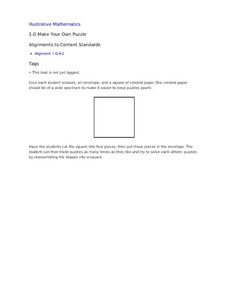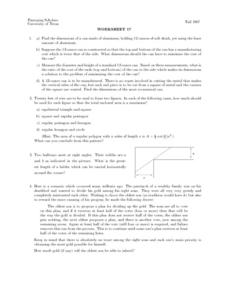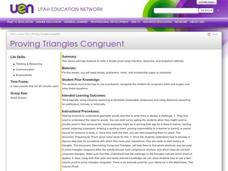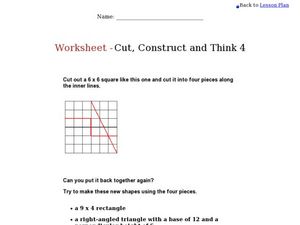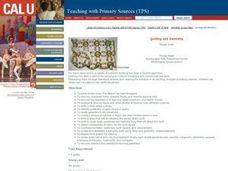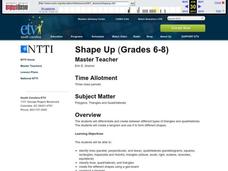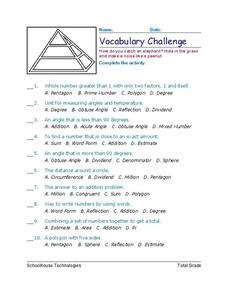Illustrative Mathematics
Make Your Own Puzzle
Puzzling over what geometry activity to teach next? Look no further. This simple activity teaches young mathematicians how shapes can be decomposed into smaller figures, and how smaller figures can be assembled into larger shapes. To...
Education Development Center
Proof with Parallelogram Vertices
Geometric figures are perfect to use for proofs. Scholars prove conjectures about whether given points lie on a triangle and about midpoints. They use a provided dialogue among fictional students to frame their responses.
Curated OER
The Trapping of Trapezoids
This is a nice hands-on activity where young geometers create trapezoids and calculate their area by looking at areas of quadrilaterals and triangles.
Curated OER
Similar Triangles - Geometry Exploration
Eighth graders become engaged in a lesson plan in geometry to improve mathematical skills. They construct triangles, segments, and points using Geometer's Sketchpad to demonstrate how dilations of triangles and rectangles change...
Curated OER
Worksheet 17 - Area
In this area worksheet students read story problems, determine the necessary information to solve the problem. They find the amount of material needed to construct three-dimensional figures. Students determine the greatest and least area...
Curated OER
Quiz: Geometric Constructions-Congruence
In this congruent figures worksheet, students answer ten true or false questions. A sample question reads: "Two triangles are congruent when their shape and size will be the same."
Curated OER
Pascal's Triangle
Students study Pascal's triangle. They construct their own version of Pascal's triangle, and relate some of the uses for it. While working through this process, students practice their integer multiplication and division skills.
Curated OER
Transforming Triangles
Sixth graders examine how to graph translations (slides) and reflections (flips) on a coordinate plane. They practice the slides and flips kinesthetically and apply it to a worksheet working with triangles.
Curated OER
Proving Triangles Congruent
Students examine Triangle Congruency. In this measurement comparison lesson, students use inductive, deductive and analytical thinking skills to prove triangle congruency. Students analyze and record their findings on activity worksheets.
Curated OER
Kid Garden Math
Students design a geometric garden. Shapes to be included are squares, triangles, and hexagons. After reading a book together about shapes, students get to use construction paper to cut out and design their own shape garden.
Curated OER
Cut, Construct and Think 4
In this geometry activity worksheet, students cut a 6x6 according to the directions and construct the 4 listed shapes from the pieces. Students also respond to 5 questions that require them record details regarding the 5 listed shapes.
Curated OER
Finding The Center Mass of a Triangle
Students calculate the center mass of a triangle. In this geometry activity, students use the median to find the center mass. They discuss the different characteristics of triangles and their center of mass.
Texas Instruments
What's the Trig?
Learners determine the trigonometric relationships within a triangle as they construct a right triangle on the Ti-89. They find the sine, cosine, and tangent of various angles of their triangle construction.
Curated OER
Investigating Area Relationships
Learners investigate the area of various figures. They construct triangles and quadrilaterals using Cabri Jr. and discuss the relationships between different angles, side lengths, and figures.
Curated OER
Using Cabri Geometry to Create Fractals
Learners construct the Sierpinski Triangle using Cabri Jr. They use a step-by-step guide to construct the Sierpinski Triangle on their graphing calculator and then discuss the formula for constructing a nth stage Sierpinski Triangle.
Curated OER
Perpendicular Bisector Theorem
High schoolers construct perpendicular bisectors using Cabri Jr. on their graphing calculator. They then construct conditional statements about perpendicular bisectors along with their converse, inverse, and contrapositive.
Curated OER
Flip's Flag
Fifth graders apply the symmetry and angle properties of polygons and use fractions to express the relationships between the areas of rectangles, squares, and triangles. They analyze various country flags and develop mathematical...
Curated OER
Geometry Take Home Question
In this triangles, parallelograms, and kites worksheet, students solve 4 short answer problems. Students find the area of the given triangle. Students construct parallelograms and kites by cutting out and manipulating the given triangles.
Curated OER
Geometry and Quilting
Students create a quilt square for a class quilt using at least three, two-dimensional geometric figures. They research and write a brief description of at least two different quilt patterns that they find. Pupils discuss that quilts are...
Curated OER
Shape Up
Students explore differents types of triangles and quadriaterals. In this polygon lesson, students model identify and compare two and three dimensional geometric figures. Students create tangrams and discover the difference between...
Curated OER
Shapes and Introduction to Geometry
Students make a quilt. In this geometry lesson, students discuss patchwork quilts and learn some different geometric shapes and patterns that are commonly used. Students explore designs with triangles and squares and then make their own...
Curated OER
Vocabulary Challenge
In this math vocabulary worksheet, students choose which multiple choice answer best defines twenty-five mathematical terms. Students place their answers on the lines provided.
Virginia Department of Education
Angles in Polygons
Polygons — it's all about the angles. Groups work with dynamic geometry software to find the sum of the measures of the angles of various polygons. After finding the information for several polygons, the groups generate a formula that...
Curated OER
A Different Proof of the Law of Cosines
In this proofs instructional activity, students construct 1 proof of the law of cosines. Students construct a right triangle within a circle to prove the law of cosines.


